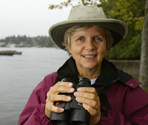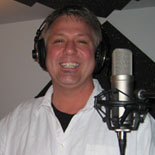

Join BirdNote tomorrow, November 30th!
Illustrator David Sibley and actor H. Jon Benjamin will face off in the bird illustration battle of the century during BirdNote's Year-end Celebration and Auction!
In September, 1851, Henry David Thoreau wrote: "The Whip-poor-wills now begin to sing in earnest about half an hour before sunrise, as if making haste to improve the short time that is left them. As far as my observation goes, they sing for several hours in the early part of the night . . . then sing again just before sunrise. ... It is a bird not only of the woods, but of the night side of the woods."
If you ever miss a BirdNote, you can always get the latest episode. Just tell your smart speaker, "Play the podcast BirdNote."
BirdNote®
Eastern Whip-poor-will – Bird of the Night Side of the Woods
Written by Frances Wood; revised by Bob Sundstrom
This is BirdNote.
[Whip-poor-will song throughout]
In September of 1851, Henry David Thoreau wrote:
“The Whip-poor-wills now begin to sing in earnest about half an hour before sunrise, as if making haste to improve the short time that is left them. [Whip-poor-will song]
…They sing for several hours in the early part of the night, then sing again just before sunrise.”
Clearly and continuously, the bird announces its name [Whip-poor-will song].
In summer to early fall, Eastern Whip-poor-wills breed in woodlands of eastern North America. Their camouflaged plumage blends seamlessly with dead leaves on the forest floor. At dawn and dusk and all through moonlit nights, whip-poor-wills sally out from tree branches to hawk flying insects.
Woodland habitat has greatly diminished for Eastern Whip-poor-wills, as forests become more fragmented. The National Audubon Society lists them among the Top 20 Common Birds in Decline. Protecting and restoring large expanses of forest are crucial for many forest species, including the whip-poor-will. [Whip-poor-will song and crickets]
It remains, as Thoreau described: “…a bird . . . of the night side of the woods, where you may hear the whip-poor-will in your dreams.”
For BirdNote, I'm Michael Stein.
If you ever miss a BirdNote, you can always get the latest episode. Just tell your smart speaker, "Play the podcast BirdNote. Learn more on our website, BirdNote.org.
###
Bird sounds provided by The Macaulay Library at the Cornell Lab of Ornithology, Ithaca, New York. Recorded by W.L. Hershberger.
BirdNote’s theme music was composed and played by Nancy Rumbel and John Kessler.
Producer: John Kessler
Executive Producer: Chris Peterson
© 2013 Tune In to Nature.org September 2013 / 2018 / 2020 Narrator: Michael Stein
ID# 091007WPWIKPLU EWPW-01c



